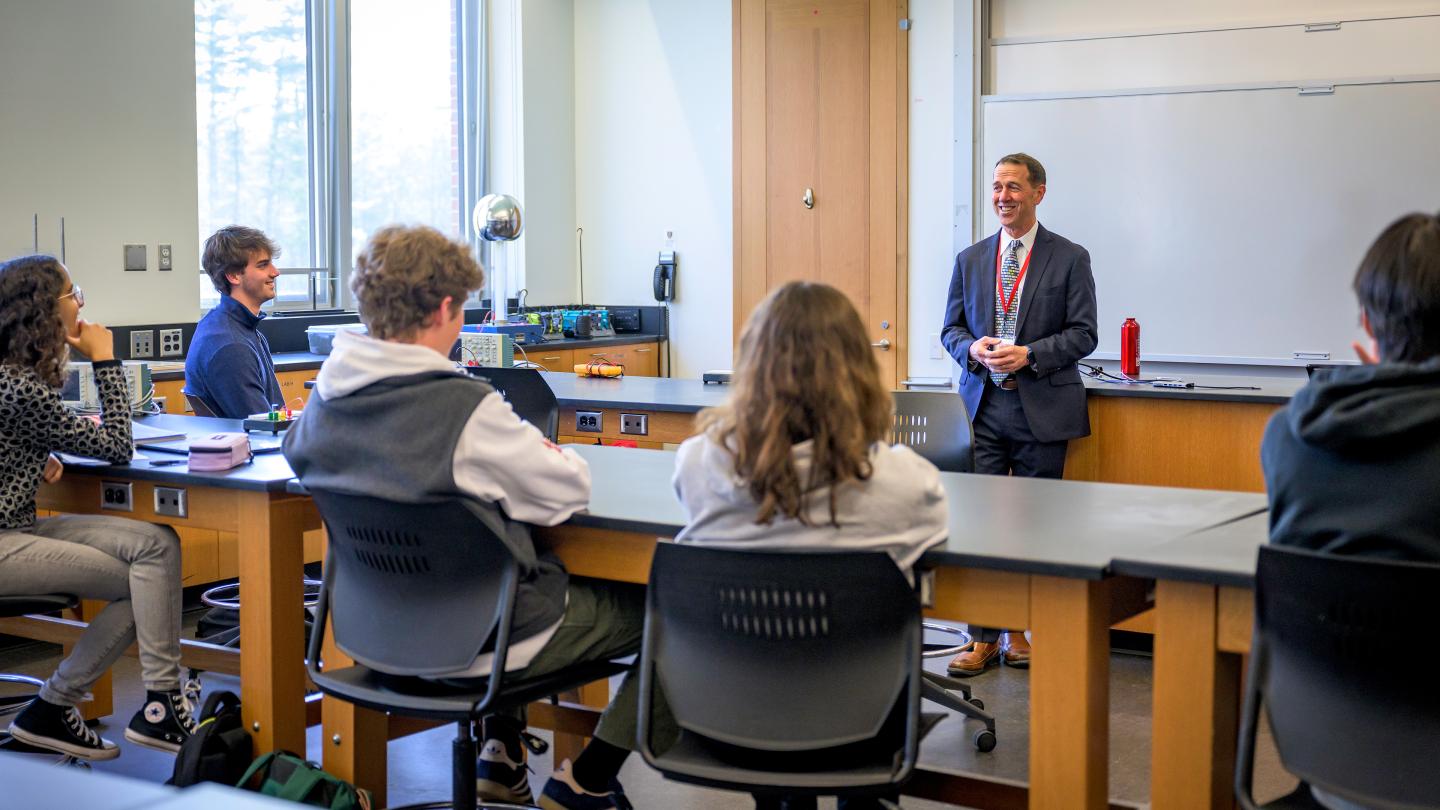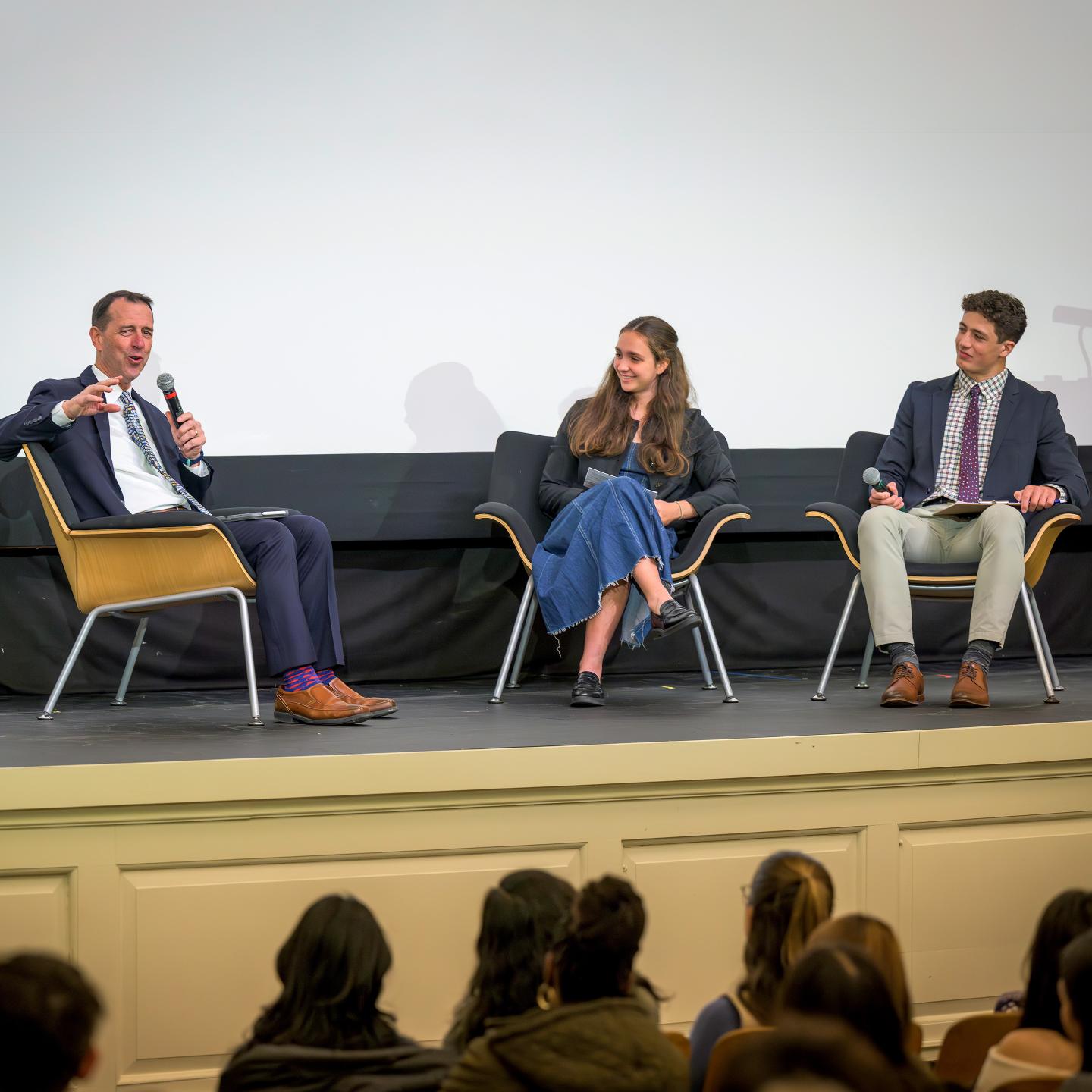

The Conroy Distinguished Visitor regaled students with tales of his military service from the depths of the seas to the upper echelons of the U.S. government.
BY KATE DUNLOP
John Richardson, a retired four-star admiral in the United States Navy who served as the 31st Chief of Naval Operations (CNO), spent Friday, April 19, at St. Paul’s School as the 2023-24 Conroy Distinguished Visitor. A physics major at the U.S. Naval Academy who holds master’s degrees in electrical engineering from MIT and the Woods Hole Oceanographic Institution as well as a master’s in national security strategy from the National War College, Richardson sat in on classes, offered remarks during a special chapel held in Memorial Hall and had lunch with students.
In his 37 years of active military duty, Richardson served aboard and commanded submarines and held a number of other high-level Navy positions. In 2012, President Barack Obama nominated him to serve as the Director of the Naval Nuclear Propulsion Program and in 2015 to the Navy’s top administrative position of CNO. In 2019, Richardson was named a Senior Fellow at the Johns Hopkins Applied Physics Laboratory. He currently serves on the Director’s Council of the Scripps Institution of Oceanography.
In a morning session with Third Form Physics First classes taught by Science Teachers Ben MacBride and Rick Pacelli, Richardson noted that a physics mindset means being trained to think broadly. He then entertained a wide-ranging series of questions about life on a submarine, from the quality of the food (excellent) and how many personal belongings are allowed (not many) to the form and function of a nuclear submarine.
“A nuclear submarine is a great white shark,” said Richardson, contrasting it with the humanitarian capabilities of a Navy ship in peacetime. “A sub is a hunter-killer, an intelligence gatherer. The mission is to remain undetected and extend the peace as long as possible; the work is deterrence.”

My biggest takeaway from speaking with and hearing from Admiral Richardson is that strong leadership requires not only independence and accountability but also dependence on our closest relationships and core values.”
In MacBride’s Quantum Physics class and in his chapel remarks, Richardson, who estimates he spent 11 cumulative years submerged, shared more sea stories that, combined, tell the tale of a man who advanced not only through intelligence, creativity and dedication to his teams but also through the grace of forgiveness in the form of a few extra chances. Among his career’s high notes were lows that included getting “kicked out twice” from his interview for the submarine force and a training exercise near-mishap that left him thinking he might have to find another path. When he wasn’t fired, he was “super grateful” for the second chance and made the most of it.
It’s apt that forgiveness should play a pivotal role in the life of a man of great faith whose actions are based on three relationships and his vow to each: God, his spouse and the U.S. Constitution. Sporting representations of each (socks with fish, an early Christian symbol; his wedding ring; and a tie spelling out the Preamble in license plates), Richardson concluded his chapel talk by likening the surface, middle and deep-current strata of the ocean to a person’s connections, creativity and character, respectively, which he says in turn inform their actions, mission and relationships.
“Your character is going to define your relationships,” he said. “St. Paul’s School spends a tremendous amount of time developing elements of character — things like integrity, honesty and empathy. These are the deep currents that will be the foundation for all the decisions you make later. I’ve found that when people struggle, it’s because they haven’t spent enough time understanding their deep currents in their mind and in their spirit to give them the foundation for how they’re going to manage their way through situations.”
Sixth Formers Edie Jones and Colter Sienkiewicz were on the Memorial Hall stage with Richardson to lead the Q&A portion of the program. After, Sienkiewicz said that he found it inspiring to meet someone who has dedicated their life to being a servant leader.
“Admiral Richardson said he believes in second chances, which … is a side of the military not often seen,” he noted. “My biggest takeaway from speaking with and hearing from Admiral Richardson is that strong leadership requires not only independence and accountability but also dependence on our closest relationships and core values.”
Richardson wrapped up his visit with students in Chinese Language Teacher Jenny Li’s Chinese Seminar and Humanities Teacher Josh Duclos’ Political Philosophy class.
The Conroy Distinguished Visitors Program
Established to stimulate and inspire students at St. Paul’s School, to enlarge their view of life, and to suggest directions in which they can serve their country and their communities effectively, the Conroy Distinguished Visitors Program invites outstanding leaders in various fields to the School for discussions, meetings, schoolwide performances and lectures. Conroy Visitors have included poet/author Maya Angelou, cellist Yo Yo Ma, the Chicago Symphony Singers, U.S. Poet Laureate Billy Collins, three-time Olympic gold medalist Misty May-Treanor and Dr. Ibram X. Kendi, among others.



